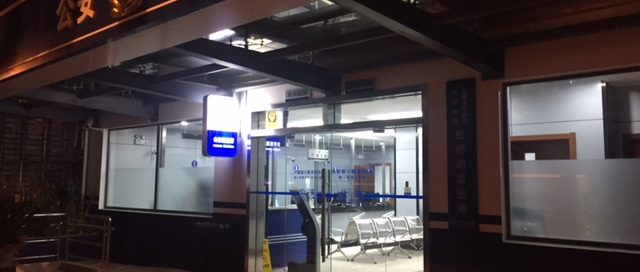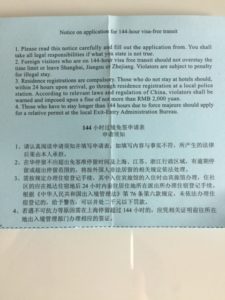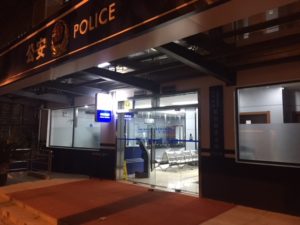The 144-Hour Transit Visa to China: Risky If You Are Staying With Friends or Anywhere Besides a Hotel
The complexities and costs of obtaining a tourist visa to China can be avoided sometimes by taking advantage of the transit visa program that is available in some major cities like Shanghai, Beijing, and Guangzhou and several others. Shanghai offers a 144-hour transit visa, which is great for a brief stay here. Some places may offer 72-hour transit visa or 24-hour transit visas. These visas don’t cost anything as far as I know and are easy to get. You have to show that you have a departing international flight scheduled within the allocated time from your arrival, and you need to stay in the designated area. The Shanghai-Zhejiang-Jiangsu 144-hour visa allows you to travel throughout Shanghai and its neighboring provinces, Zhejiang and Jiangsu while here. Getting the transit visa is easy, at least at the Pudong Airport in Shanghai, where there is a special line at the far left of the customs area called “Transit 144/24” for the 144-hour and 24-hour visas. It’s a great program — but there are some rules that can create trouble if you aren’t prepared.
The biggest problem might be if you are planning on staying with friends or an AirBNB rather than a normal hotel. An important part of the transit visa process is ensuring that you and your place of residence are registered with the police. The work to do this is usually handled by hotel staff who make copies of your passport information and process things with the police.
What if are aren’t staying at a hotel? Relatives of mine who just arrived here yesterday informed me of the process. When you register for the visa, the helpful staff will say no problem and explain that you just need to go to a police station within 24 hours. They will give you a card that also tells you to do this, as shown below:
So in the evening after our friends arrived early on a Friday morning, we walked a few hundred yards to our local police station. Strangely, I felt that I should bring along information to renew my own residence registration with the police in since the one I did recently might need updating after finalizing my recent visa renewal. As a result, I brought the contract for our apartment.
To my surprise, when we entered the police station and explained what our friends needed, the woman in charge asked for our contract. Whew! Felt so relieved. Here it is. Then she looked at the address. “Oh, you live in Minhang District. This is Changning District. You are at the wrong station.” We explained that the authorities at the airport and the card simply tell us to go “a local police station,” and this is the local one closest to us. She laughed and said, “No, you need to go to Minhang.” Of course.
Minhang has many police stations, but in our own registration efforts, we learned there is only one that we can use for our address. So the card should explain that. The one we have to go to is quite far away and took over 20 minutes by cab to reach. Time was running out because we knew the key office at the police station would close by 8 pm.
When we got there, the woman explained that we needed our contract — check! — and also a license from the management of our apartment building showing that we were properly authorized to live there. Wow, a second surprise document required. Amazingly, as were packing up to go on this journey, I had grabbed that also. Check!
Or maybe not. The officer explained that the license was for my wife and I, but I also needed to get the same form for our guests. Huh? This would require them to have a contract of some kind, as far as I know, and would require a great deal of time and effort, and might not be possible at all. She shook her head and insisted, but in the end with a gentle smile and a soft request for help, she shook off the hidden rules somehow and gave us a break, but said next time we should get the license. No idea how to do that, honestly, but guess we’ll have to try.
In Chine, there are rules that can be hard to predict and sometimes vary from place to place or person to person. This officer was kind and gave us a break. Others might not have been so gracious. But in any case, if you are coming to China on a transit visa, stay at a hotel and make life simple.
If you are inviting guests to stay with you in China who may come on a transit visa, work with your local police station ahead of time to know just what documents will be needed and make sure you can get them.



